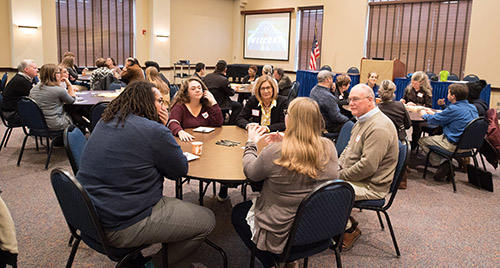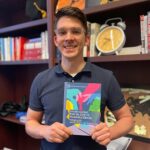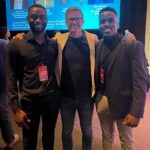
Wooster Students, Community Members Find Common Ground in “Bridging Along Beall Avenue”

WOOSTER, Ohio – Students at The College of Wooster campus and members of the surrounding community discovered more common ground than may have been initially expected during a series of social gatherings, called “Bridging Along Beall Avenue: Living Room Conversations to Connect Campus and Community,” that took place this semester.
Funded by a $5,000 grant from Campus Compact, a Boston-based non-profit organization working to advance the public purposes of higher education, a group of faculty and staff members spearheaded an effort to bring together those with opposing political views after tensions rose following the 2016 general election. In its simplest form, the idea was to convene, in small groups, people with perceived diverse perspectives, then to discuss those issues in a respectful manner.
The gatherings consisted of five six-member groups, mixing Wooster students – more than 80 applied for the 15 available spots – with diverse political backgrounds and residents of the City of Wooster, also with varying ideologies. In the small group settings, they met over meals twice with a guided discussion on topics, starting out simply getting to know each other, such as “What sense of purpose/mission/duty guides you in your life?,” and then moving on to more complex subjects, including “What are your impressions of political polarization and how do you think it’s affecting our community and the country?.”
Additionally, all 30 participants worked side-by-side on a service project, assembling soup packets and distributing blankets at the Wooster Mennonite Church in February. They also met as a full group again to share their experiences and thoughts on the program during a closing session at Bruch Hall inside First Presbyterian Church in April.
The group was in unanimity that “Bridging Along Beall Avenue” was a beneficial experience, though, participants offered varying reasons.
Shana Zelenka, a junior political science major from Copley, Ohio, noted that every student “has a very different experience” with the community during their four years and part of the program was to show locals that “we’re not ‘cookie cutter’ students attending the College.” And flipping points of view, she’s also hopeful that such gatherings will help “students be more inclined to engage with the community.”
As a current senior at the College who grew up in Wooster, Oliver Warren had a unique perspective and offered that the experience was “an excellent exemplar in social bridging” and that his group “grew astonishingly close with each other.”
Another one of the participants was the mayor of Wooster, Bob Brenneman, and he was impressed by the undertaking. “(This) reconfirmed in my mind that people have many commonalities, and the larger group you get in, the more diverse and divisive things become. But if you bring people together into smaller groups, all of a sudden those commonalities bubble out and you realize how much we do have in common. That was gratifying,” he commented.
One common theme from the participants was optimism for further improved communication and relations.
Denise Bostdorff, one of the program organizers and professor of communication studies at Wooster, said, “So many times, when people don’t talk and you surround yourself with like-minded individuals, assumptions are made. Whatever political differences people may have, there’s often a lot of common ground that those people share. I’m hoping, in general, that students making these connections in the community can lead to better relationships going forward … and maybe, when adverse situations occur, some joint action can take place.”
Posted in News on May 9, 2018.


